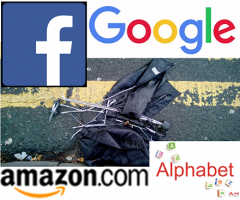
What if the digital marketers’ umbrella springs a leak?
Will the GDPR hasten the demise of the big tech platforms?
The digital platforms have offered direct marketers a great alternative to traditional channels and activities. Now brands can identify, communicate with and sell to consumers through and with the help of Facebook and the others.
However, the brands and their digital agencies are operating in the platforrms’ closed worlds, according to their rules. And now the rules could be about to change…
Will the GDPR hasten the demise of the big tech platforms?
The digital platforms have offered direct marketers a great alternative to traditional channels and activities. Now brands can identify, communicate with and sell to consumers through and with the help of Facebook and the others.
However, the brands and their digital agencies are operating in the platforrms’ closed worlds, according to their rules. And now the rules could be about to change…
A less social network
This recent article by the BBC’s Amol Rajan highlights 8 reasons why Facebook’s relentless rise appears to have peaked: www.bbc.com/news/entertainment-arts-42974551 . Most of those 8 reasons will be familiar to us all from watching the news of late. And if you have children under the age of 20 they’ll wearily explain that ‘no-one’ ever uses Facebook nowadays. However, the Rajan’s 7th reason particularly caught my eye – “GDPR”.
The GDPR is the EU’s General Data Protection Regulation (www.eugdpr.org/). This the EU’s first significant attempt to update data protection rules in 20 years, which will take effect in the UK in 2018 when the Data Protection Bill making its way through Parliament becomes law. Arguably, although data protection laws needed updating generally and the new laws will impact millions of organisations, the primary driver for the GDPR was the rise and rise of a handful of powerful US West Coast technology platforms. Take your pick of the collective acronym (FANG, FAGMA, GAFA), but most notably Facebook, Alphabet/Google and Amazon.
Mr Zuckerberg’s Umbrella
We’re all bored of hearing that ‘we’re living in an omni-channel world’, in which customers increasingly swap and change the channels they use to communicate with and respond to brands. The purely digital aspects of marketing appear to have been largely untroubled by the GDPR, thus far. Due to the size and market dominance of Facebook (including WhatsApp and Instagram) a whole industry of social media marketing exists in the Facebook world, operating to its rules. This legal and operational ‘umbrella’ for digital marketing is unavoidable, but potentially unsustainable.
Storm Clouds Over Brussels
Tellingly, Facebook has already said that it needs to be more respectful of users’ personal data rights and expectations. Sheryl Sandberg has said it will roll out a global privacy centre this year for users to use (www.techcrunch.com/2018/01/24/facebook-to-roll-out-global-privacy-settings-hub-thanks-to-gdpr/). But it shows no great insight to speculate that irrespective of what Facebook’s saying about enhancing data privacy protections, it remains clearly in the sights of the EU. It’s less than a year since Facebook was fined €110m by the EU Commission for instigating automated user account linking across Facebook and WhatsApp when it originally pledged that it wouldn’t (www.europa.eu/rapid/press-release_IP-17-1369_en.htm). And few people would regard Facebook – or Google – as poster boys or girls for respecting data privacy or not exploiting a big and growing digital advertising market share (~20% for Facebook, ~40% for Google). Commissioners Margrethe Vestagner (Competition) and Andrus Ansip (Digital Single Market) are both likely to be busy critically examining Facebooks terms & conditions and data privacy policies for both B2B and B2C consumers.
Gimme Shelter
So, there’s a strong possibility that the big technology platforms’ terms of trade will be changed. Almost certainly this in turn will make life more difficult for brands and agencies using the platforms to identify, match, profile and sell to customers. In which case, what should those brands and agencies do? They can’t practically anticipate in detail what may happen or when (if nothing else, we know that the Facebook, Google and Amazon are skilled at defending their positions, commercially and legally), but they can imagine what future changes might entail and prepare accordingly.
Here are 5 areas they should consider and start working on now, irrespective of what happens between the US, the EU or the UK Information Commissioner’s Office:
1. Existing and potential customers’ understanding of their data privacy rights will only increase – brands need to be aware and prepared for this
2. Customers will become more aware of the nature of the data exchange they may be asked to enter into – so brands need to be better able to articulate what they plan to do with personal data, why and to how that will benefit the customer
3. Brands’ abilities to actively manage customer data, record interactions and consents – as well as manage consumers’ enhanced rights under the GDPR (such as the Right to Erasure, Data Portability and Subject Access Requests) – need to be optimised, possibly with new data management solutions
4. Brands’ identification and due diligence processes for potential new partners will need to be enhanced from a data privacy and data sharing perspective
5. Brands’ person-to-person (contact centre & shop floor) and self-help support will need to reflect a new world of enhanced consumer data rights and awareness
Brands don’t want to be left exposed if their Facebook and Google umbrellas start to leak…



